AIRASIA - KUALA LUMPUR.Malaysia's flagship budget carrier AirAsia Group Bhd expects its 2020 capacity to be just 45%-60% of last year's levels due to the coronavirus outbreak and to fill 70-75% of seats this year compared with the usual 85%.
The forecast was released in a presentation posted on the airline's website on Tuesday, a day after it reported its biggest first-quarter loss since it listed on the Malaysian bourse in November 2004, according to Refinitiv Eikon data.
Read Also: AirAsia Group cetak penjualan tertinggi hingga 41.000 kursi dalam sehari
AirAsia expects travel demand to rebound to an extent in 2021, with capacity reaching 85% of its 2019 levels and load factor, a measure of the percentage of seats filled, returning to 85% in 2021, according to the presentation.
AirAsia posted a loss of 803.3 million ringgit ($187.91 million) for the quarter ended March, from 96.1 million ringgit net profit in the year-ago period. Revenue fell 15% to 2.31 billion ringgit.
AirAsia shares were down 2.8% at 0545 GMT on Tuesday.
The company management had guided that an equity raising via a placement or rights issue looked imminent, Affin Hwang Capital analyst Isaac Chow wrote in a note.
AirAsia last month said it had received proposals from investment bankers, lenders and potential investors to help cope with the pandemic.
It said on Monday it had ongoing deliberations for joint-ventures and collaborations that might result in additional third party investments in specific segments of the group's business.
Demand was positive since the carrier gradually restarted domestic routes after grounding most of its fleet in March due to movement restrictions to contain the coronavirus, AirAsia added.
Read Also: Ini pilihan kompensasi bagi penumpang AirAsia yang batal terbang akibat Covid-19
The company had sought payment deferrals from suppliers and lenders to ensure sufficient working capital and had restructured a major portion of its fuel hedges, Chief Executive Tony Fernandes said in a statement on Monday.
AirAsia has also applied for bank loans in countries it operates in to shore up liquidity, the statement said. ($1 = 4.2750 ringgit)
/2020/04/14/1080398379p.jpg)









